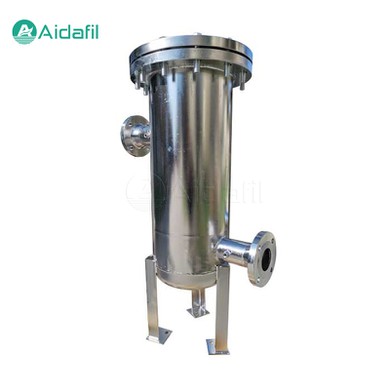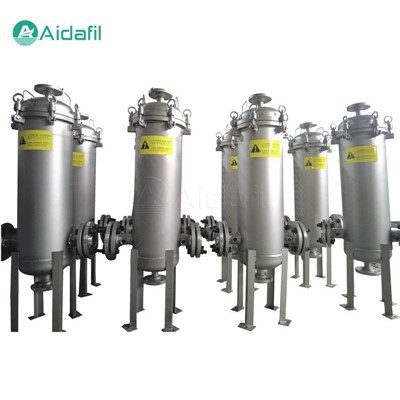
Low Operating Cost Security Filter
The Low Operating Cost Security Filter, an important part of water treatment systems, is mainly used to remove tiny suspended solids, colloidal particles and microorganisms in the fluid to ensure the normal operation of subsequent treatment equipment and the quality of the effluent.

The Low Operating Cost Security Filter is an important part of water treatment systems. It is mainly used to remove tiny suspended solids, colloidal particles and microorganisms in the fluid to ensure the normal operation of subsequent treatment equipment and the quality of the effluent. This filter is usually used as a downstream device of a multi-media filter, located at the front end of membrane separation processes such as reverse osmosis (RO), nanofiltration (NF), and ultrafiltration (UF), which play a protective role and prevent large particles from causing damage to membrane components.
Product Highlights
1. In line with national standards.
2. High filtration accuracy, uniform pore size of the filter element.
3. Small filtration resistance, large flux, strong pollution interception ability, long service life.
4. High cleanliness of the filter element material, no pollution to the filter medium.
5. Resistant to acid, alkali and other chemical solvents.
6. High strength, high temperature resistance. The filter element is not easy to deform.
7. Low price, low operating costs, easy to clean. The filter element can be replaced.
Parameters
|
filter cartridge quantity |
3-123 |
|
Material |
Cylindrical shell, 304 or 316L stainless steel; Equipped with multiple filter cartridges |
|
Use |
Used to filter out fine substances after multi-media filtration (such as tiny quartz sand, activated carbon particles, etc.) |
|
Filter flow |
3-246m3/h |
Structure Composition
The Low Operating Cost Security Filter is mainly composed of the following components:
1. Shell: Generally made of stainless steel, it has good corrosion resistance and strength, and can withstand certain internal pressures and external environmental influences.
2. Filter element: This is the core component of the security filter, usually made of polypropylene (PP), polyester (PE) or other synthetic materials, with microporous structures of different pore sizes, and filter elements with different precision can be selected according to needs.
3. Import and export pipelines: Pipes connecting the filter to other parts of the system to ensure the smooth flow of fluid.
4. Support structure: Used to fix the filter element and ensure that it remains in the correct position and shape during the filtration process.
5. Seals: Ensure that all connection parts of the filter do not leak, including O-rings, gaskets, etc.
Working Principle
The working principle of the Low Operating Cost Security Filter is relatively simple, mainly using physical sieving to remove impurities in the fluid. When the liquid to be treated enters the filter under pressure, it will pass through the microporous structure of the filter element. The size of these micropores is smaller than the diameter of the particles to be removed, so the particles will be trapped on the surface or inside the filter element, and the clean liquid can be discharged through the filter element and discharged from the outlet.
As the filtration process progresses, contaminants on the filter element will gradually accumulate, resulting in increased filtration resistance, which in turn affects filtration efficiency and flow. In order to maintain filtration performance, the filter element needs to be replaced or cleaned regularly.
Application Field
The Low Operating Cost Security Filter is widely used in a variety of industrial and civilian applications, including but not limited to:
1. Drinking water treatment. Remove tiny suspended solids and bacteria from tap water to improve water quality.
2. Industrial water. provides purified water for boilers, cooling towers, chemical reactors, etc.
3. Electronics industry. used for the preparation of ultrapure water, meeting the high standards of semiconductor, liquid crystal panel production.
4. Food and beverages. Ensure that the water quality in the production process meets hygienic standards and avoids product contamination.
5. Pharmaceutical industry. used for water treatment in the pharmaceutical process to ensure sterile conditions for pharmaceutical production.
Maintenance and Management
In order to ensure the long-term stable operation of security filters, proper maintenance and management are required.
- Regularly check the blockage of the filter element and replace or clean it promptly.
- Monitor the pressure difference between the inlet and outlet of the filter, and take timely measures when the pressure difference exceeds the set value.
- Keep the filter clean to avoid the intrusion of external contaminants.
- Perform regular performance tests on the filtration system to ensure that its filtration performance meets requirements.
FAQ
1. Q: What is the function of a filter?
A: The main function of a filter is to remove solid particles, impurities, and harmful substances from liquids or gases, in order to achieve purification, clarification, and protection of equipment.
2. Q: How to choose a suitable filter?
A: When choosing a filter, factors such as the properties of the material being filtered (e.g., viscosity, temperature, corrosion), required filtration accuracy, processing capacity, operating pressure and medium, as well as the type, material, size, and installation method of the filter should be considered.
3. Q: What is the working principle of a filter?
A: The working principle of a filter mainly relies on physical screening, deep interception, absorption, or chemical reactions to remove impurities or harmful components from the material being filtered.
4. Q: How to maintain and care for a filter?
A: Maintenance of filters includes regular cleaning or replacement of filter elements, inspection of seals and fasteners, maintaining stable operating pressure, and avoiding overloading. Specific methods should be referenced from the filter's instruction manual and maintenance guides.
5. Q: What is the service life of a filter?
A: The service life of a filter depends on its working environment, processing volume, and filtration accuracy. Generally, when the filter's pressure drop reaches a certain value or the filtration effect decreases significantly, it needs to be replaced or cleaned.
6. Q: What should be paid attention to during filter installation?
A: During filter installation, attention should be paid to the directionality, ensuring that the fluid enters and exits from the correct ports. Also, the piping system should be cleaned before installation, and the filter should be securely fastened and sealed as required by the instructions.
7. Q: What is the replacement cycle for filters?
A: The replacement cycle for filters depends on their working conditions and filtration requirements, and is usually indicated by pressure difference indicators or timers. When the filter's pressure drop reaches the set value or the filtration effect decreases, it should be replaced in a timely manner.
Why Choose Us
· Professional manufacturer with many years' experience
· Good quality with competitive price
· OEM & ODM are welcome
· Various payment items are acceptable
· Good service by experienced manager
AIDA Philosophy
1. Management Concept:
· Satisfy the customers' demand --- Touch customers, trust with our products and services
· Make employees happy --- Pursue higher material and spiritual happiness
2. Company Mission:
· Focus on customer needs, provide best filtering solution
· To be the lifelong partner with customers
3. Corporate Vision:
· Become a global purification leadership brand
4. Values:
· Customer: Pursue the ultimate experience, enjoy excellent quality
· Team: Trust, responsibility, growth, win-win
· Work: Simple, sincere, efficient, dedicated
Hot Tags: low operating cost security filter, China, factory, price, buy, Hydraulic Filter Element, Air Oil Separator, compressed air filter element against oil vapor, dryer filter for air compress, lube oil filter elements for steel plant, 15000 l min duplex basket strainer







